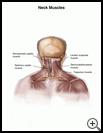
Neck Strain
________________________________________________________________________
KEY POINTS
- A neck strain is a stretch or tear of a muscle in your neck.
- Strains may be treated with moist heat, ice, medicine, stretching and strengthening exercises, and sometimes physical therapy.
- If you have a job or hobby that requires you to hold your neck in one position for long hours, like working at a computer all day, take breaks and stretch your neck muscles to help prevent neck strain.
________________________________________________________________________
What is neck strain?
A neck strain is a stretch or tear of a muscle in your neck.
What is the cause?
Neck strains usually happen when the head and neck are hit or forcibly moved, such as during rough contact sports or a whiplash injury (like a car accident or a fall) where your head and neck are snapped back and forth. Sometimes strains happen from an awkward position during sleep or poor posture while you work at a desk.
What are the symptoms?
The main symptom is pain in your neck. You may have pain when you move your head to the side or when you try to move your head up or down. The neck muscles may tighten (spasm) and feel hard and very tender to the touch. You may feel pain right after an injury or not until a few hours or days after the injury.
Other symptoms may include:
- Stiff neck
- Dizziness
- Unusual feelings, like burning or a pins-and-needles feeling
- Headache
How is it diagnosed?
Your healthcare provider will ask about your symptoms, medical history, and activities and examine your neck. You may have X-rays to make sure the bones in your neck (vertebrae) are not injured.
How is it treated?
Your healthcare provider may recommend stretching and strengthening exercises and other types of physical therapy to help you heal.
The pain often gets better within a few weeks with self-care, but some injuries may take longer to heal. It’s important to follow all of your healthcare provider’s instructions.
How can I help take care of myself?
To help relieve pain:
- Take nonprescription pain medicine, such as acetaminophen, ibuprofen, or naproxen. Read the label and take as directed. Unless recommended by your healthcare provider, you should not take these medicines for more than 10 days.
- Nonsteroidal anti-inflammatory medicines (NSAIDs), such as ibuprofen, naproxen, and aspirin, may cause stomach bleeding and other problems. These risks increase with age.
- Acetaminophen may cause liver damage or other problems. Unless recommended by your provider, don't take more than 3000 milligrams (mg) in 24 hours. To make sure you don’t take too much, check other medicines you take to see if they also contain acetaminophen. Ask your provider if you need to avoid drinking alcohol while taking this medicine.
- Put an ice pack, gel pack, or package of frozen vegetables wrapped in a cloth on the injured area every 3 to 4 hours for up to 20 minutes at a time.
- Put moist heat on the sore area for 10 to 15 minutes before you do warm-up and stretching exercises. Moist heat may help relax your muscles. Moist heat includes heat patches or moist heating pads that you can buy at most drugstores, a warm wet washcloth, or a hot shower. To prevent burns to your skin, follow directions on the package and do not lie on any type of hot pad. Don’t use heat if you have swelling.
You may find that it helps to alternate putting heat and ice on your neck.
Follow your healthcare provider's instructions, including any exercises recommended by your provider. Ask your provider:
- How and when you will get your test results
- How long it will take to recover
- If there are activities you should avoid and when you can return to your normal activities
- How to take care of yourself at home
- What symptoms or problems you should watch for and what to do if you have them
Make sure you know when you should come back for a checkup. Keep all appointments for provider visits or tests.
How can I help prevent neck strain?
Neck strain may be prevented by keeping your neck muscles strong and flexible. Ask your healthcare provider about stretching and exercises that may help. If you have a job or hobby that requires you to hold your neck in one position for long hours, like working at a computer all day, it’s very important to take breaks and stretch your neck muscles.

